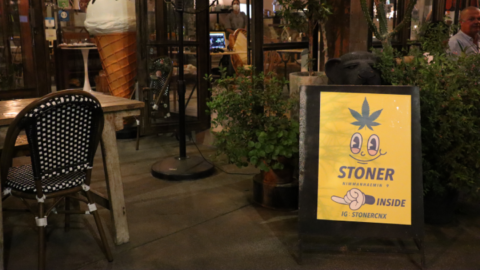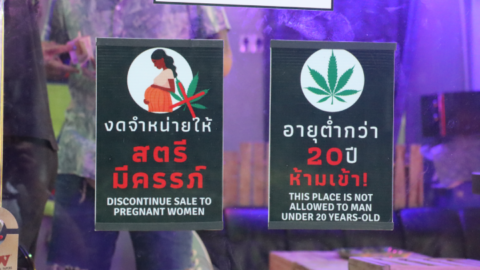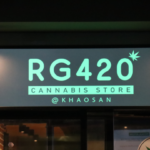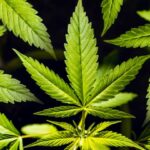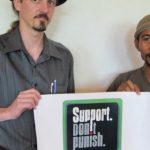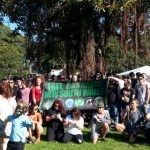Australian Police Continue to Raid Cannabis Farmers… Meanwhile in Thailand

Strike Force Mactier raided a Peats Ridge property on 26 August, seizing 50 kilograms worth of cannabis head and 2,137 plants from four greenhouses.
NSW police officers arrested three men in relation to the setup, charging them with large commercial cultivation and commercial supply.
With an estimated street value of $8 million, the cannabis was later destroyed by police with the assistance of the Rural Fire Service NSW.
The major bust comes on the back of similar such large-scale takedowns around the country, including an $80 million seizure in Parkes, a $40 million raid in southern Queensland and the shutting down of a $2 million grow house operation in western Sydney’s Campsie.
Former South Australian police officer turned cannabis campaigner Damon Adams has explained that officers can’t stand such operations, as dealing with the crops after the raid is one of the “most time consuming jobs you can do as a cop.”
“A lot of cops would like to see it legalised and regulated,” Adams said. “It’s going to mean a lot more time for them on the streets to do proactive policing and go after criminals that actually have legitimate victims.”
A civilised approach
But whilst the authorities in this country continue to baulk at the idea of legalising the fairly innocuous plant, over in Thailand the government has removed all criminal sanctions directly relating to the plant, so now it’s available in retail stores, outdoor markets, and even shopping malls.
These days, in the nation’s second largest city Chiang Mai, numerous cannabis stores are selling a variety of products ranging from edibles, whether that be gummies, cookies or brownies, or there’s the smokable form, which you can purchase via the gram or in pre-rolled joints.
The government removed cannabis from its scheduling as a controlled narcotic plant in February, and on 6 June, it became legal to consume, unless you’re under 20 or a pregnant or breastfeeding woman, and the sale of cannabis products is aboveboard, as long as a business is licenced.
An American expat in Chiang Mai told Sydney Criminal Lawyers that the government is set to place further restrictions on the cannabis market, and that store owners he’s associated with are reluctant to talk about the coming regulations as their unsure as to how they might affect them.
Swimming against the tide
But whilst people can draw back on a joint in the outdoor area of certain cafes in Chiang Mai, in Australia, an individual can still be arrested for doing same, despite cannabis being the most widely used drug in the country after alcohol.
According to the Australian Criminal Intelligence Commission’s Illicit Drug Data Report 2019-20, 76,669 cannabis arrests took place over those 12 months, which marked a 30 percent increase over the last decade, with 91 percent of these arrests being consumer-related.
This means that the majority of energy, resources and finances Australian police are using to combat cannabis is wasted upon seizing small amounts for personal use. And whilst the taxpayer expense is significant, the harm these arrests cause the individual is much greater than the plant can cause.
But the real folly in Australian authorities maintaining the cannabis criminalisation model is that the consumption and personal possession of cannabis has been totally legal in Canberra, the seat of the Australian government, since 31 January 2020.
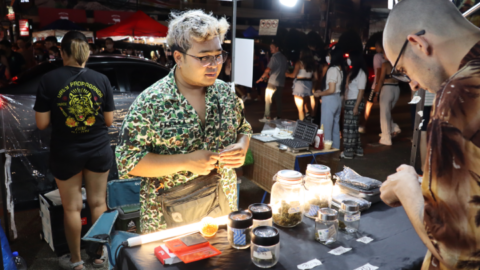
No longer a crime
The Thai government celebrated the legalisation of cannabis by handing out one million plants to households, as a measure to encourage home cultivation, and it also released 3,071 inmates who were serving time over cannabis-related offences.
Thai justice minister Somsak Thepsuthin advised the press on the day before the releases that while all cannabis convictions would be expunged, there were another 1000-odd prisoners on cannabis charges who would be kept inside to serve out their sentences relating to other crimes.
On that same day, Thai deputy national police chief Pol Gen Roy Inkhapairote announced that smoking cannabis would no longer be an offence from 9 June, but if it caused a public disturbance an individual could be fined 25,000 baht or imprisoned for up to three months.
Meanwhile, in a Chiang Mai store that appeared to be doing quite a good trade, the local owners told SCL that they weren’t concerned about the coming regulations, and they thought the government should be placing a cannabis-specific tax on all products.
And in terms of whether legal weed is here to stay, the shop owners said the shift had already occurred and it’s progressed too far to reverse, with one of the locals quipping that any attempt to roll back criminalisation would likely result in a “civil war”.
Receive all of our articles weekly
Related Articles
RELATED LEGISLATION
- Section 10 Drug Misuse and Trafficking Act 1985 | Drug Possession
- Section 23 Drug Misuse and Trafficking Act 1985 | Cultivating, Supplying or Possessing Prohibited Plants
- Section 24 Drug Misuse and Trafficking Act 1985 | Drug Manufacture or Production
- Section 25 Drug Misuse and Trafficking Act 1985 | Drug Supply
